The Fifth GOP Debate: Fear and Loathing in Las Vegas
If ever there was any doubt, the main topic during the first part of the fifth Republican presidential debate was indeed how to defeat the threat of terrorism overseas and at home. Updated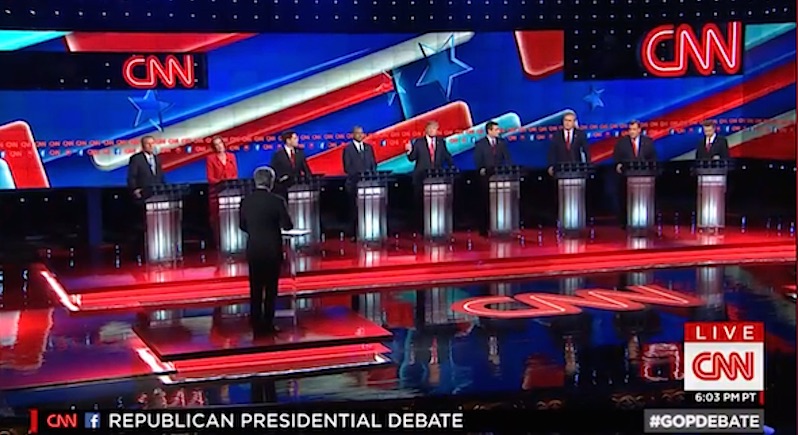
Update: 8:17 p.m.: The in-fighting continued, to the expressed chagrin of Kasich and Fiorina. Trump and Cruz clashed with the moderating team — Hugh Hewitt, Dana Bash and Wolf Blitzer — over perceived issues of timing and wording, but some flashes of accord lit up the final stretch of the main debate. The Republican candidates united around the matters of Obama’s perceived incompetence in office, Hillary Clinton’s alleged unsuitability for the presidency and how everyone in the GOP lineup represented a better bet than the other side’s options.
Other standout moments from the final stretch of the fifth Republican debate included: Trump declaring that his loyalties would continue to lie with the GOP and that he no longer supported his recent characterization of Cruz as a maniac; Cruz invoking the name of the modern GOP’s patron saint, Ronald Reagan; and Paul diverging from the pack by suggesting that “the greatest threat to our national security is our debt.”
Among all the lines spoken during the debate, the one that’s likely to draw the most fire came, expectedly, from Trump when he said he would “go after” terrorists’ family members.
Cruz and Rubio are likely to be touted in mainstream media circles as the evening’s strongest performers. While Paul’s positions on some topics won’t resonate with his party’s hard-liners, he too made a strong showing. Trump isn’t likely to be hurt by anything he said on stage. Bush’s deep war chest may keep him in the running until the primaries, but he isn’t likely to have bettered his chances significantly in Las Vegas. Meanwhile, Carson’s dip got deeper.
Check back on Wednesday for more coverage and commentary on Truthdig about this latest faceoff between the 2016 Republican presidential hopefuls.
* * *
Update: 7:38 p.m.: Rand Paul had his own cheering section in the audience at The Venetian on Tuesday night, and its members were at the ready when the subject of the debate turned to the contested notion of a no-fly zone over Syria and the U.S. administration’s relations with Russian President Vladimir Putin.
Paul first turned on Ohio Gov. John Kasich, who had declared that Syrian leader Bashar Assad “must go.” “I think it’s a huge mistake,” Paul said, firing up his supporters.
Fiorina spoke up to good effect next, clarifying her statement from a previous debate that she would refuse to communicate with Putin in certain circumstances. “I didn’t say I would cut off all communication,” she said, adding that there would be times when silence would be strategically appropriate. “He respects strength,” she added, claiming she “would not speak to him until we’ve set up that no-fly zone” in Syria.
New Jersey Gov. Chris Christie jumped in next. “I would talk to Vladimir Putin a lot ,” he said, noting that he also would support a no-fly zone. “You fly in, it applies to you,” Christie said, continuing his hypothetical conversation with Putin. Christie also had some fighting words for President Obama, calling the sitting commander in chief a “feckless weakling.”
Enter Paul, once again the only candidate to reliably sound a cautionary note about overseas interventions. “Well, I think if you’re in favor of World War III, you have your candidate,” he said, playing on Christie’s insult about Obama by calling Christie “reckless.”
“Russia already flies in that airspace,” Paul added. “They were invited by Iraq and by Syria to fly in that airspace.” Echoing Fiorina in one sense while offering quite another approach, Paul allowed that the U.S. needs “to confront Russia from a position of strength” but cautioned that it should not maneuver from “a point of recklessness that would lead to war.”
Christie responded with another Obama-slamming retort as he worked to hold onto his newly regained spot on the main stage. “Reckless people are the folks in the White House right now,” Christie said. “And if you think a no-fly zone is a reckless policy, you’re welcome to your opinion, but how’s that working so far?”
* * *
Update: 7 p.m.: During the second half of the debate’s first hour, Carly Fiorina played up her past as Hewlett-Packard’s onetime CEO by critiquing the Obama administration’s facility with technology and its position on online surveillance. “Why did we miss the Tsarnaev brothers? Why did we miss the San Bernardino couple?” she asked, suggesting that the U.S. government was “using the wrong algorithms” and is “woefully behind the technology.”
Speaking of technology, Trump was called upon to elaborate about his recent statement that we should shut down the Internet to fight terrorism. “I would certainly be open to closing parts of the Internet,” Trump said—presumably parts where Islamic State and other militant groups are virtually convening.
Next came a clash between Rubio and Cruz over how best to defeat Islamic State. Cruz, perhaps responding to recent criticism that he was tilting toward isolationism in his foreign policy stance, came on strong, positing that “overwhelming air power, arming the Kurds, fighting and killing [Islamic State] where they are” would represent the best policy. Cruz picked up on a thread that Carson had also pursued when he railed against “political correctness” as a reason for the San Bernardino attacks, saying the government did not monitor the two shooters’ social media statements closely enough. “Political correctness is killing people,” Cruz said.
Rubio specified that American troops would serve a supplementary role on the ground, helping local forces but not dominating in that mix. “We have to understand who [Islamic State] is. They must be defeated on the ground by a ground force,” Rubio said.
Bush and Trump also got into it in the second half-hour. If each candidate had his or her own buzzword for the occasion, Bush’s would have been “serious.” (Hint: That word was intended to describe his demeanor.) “You’re not gonna be able to insult your way to the presidency,” Bush told Trump. “That’s not gonna happen.”
* * *
If ever there was any doubt, the main topic during the first part of the fifth Republican presidential debate, held Tuesday evening in Las Vegas, was indeed how to defeat the threat of terrorism overseas and at home.
During the undercard debate, this time featuring Sen. Lindsey Graham and former Sen. Rick Santorum, former Arkansas Gov. Mike Huckabee and former New York Gov. George Pataki, the tone was set on the subject, leading to a few surprises as participants in the preliminary round jostled to raise their profiles in the 2016 presidential race.
The most controversial moment happened when Santorum invoked the possibility that followers of Islam might not be eligible for the First Amendment’s religious protections. “The fact of the matter is that Islam is different,” Santorum claimed, suggesting that because, as he saw it, Islam represents “a form of government” as well as a religion, “the idea that [such a combination] is protected under the First Amendment is wrong.”
Graham struck a less divisive note, noting that Muslim Americans serve in the country’s armed forces. He went on to directly address that demographic: “You are not the enemy. Your religion is not the enemy,” he said.
Another eyebrow-raiser came from Huckabee, who proposed that American mosques be surveilled for signs of radicalism.
Despite their differences about how to steer their party into a new era and the country out of danger, Huckabee summed up the theme that none of the first four contenders seemed willing to contest when he declared, “We are at war.”
The question of how to keep America safe opened the main debate. CNN’s Wolf Blitzer point-blanked Donald Trump first, who brought up his “great wall” plan once again: dividing Mexico from the U.S. On the subject of allowing refugees to come to America from predominantly Muslim countries, Trump said: “I don’t think so, Wolf, they’re not coming to this country.” If they’re already here, Trump said, “They’re going.”
Former Florida Gov. Jeb Bush was ready to lock horns with Trump, who has wasted few opportunities to antagonize Bush during prior debates. “This is not a serious proposal,” Bush said, arguing that it would alienate moderate Muslims who might otherwise serve as allies. “Donald is great at one-liners,” Bush shot back, going for the sound bite by calling Trump a “chaos candidate” who would become a “chaos president.”
This assessment triggered another ad hominem attack from Trump. “He has failed at this campaign,” Trump sniffed at Bush. “Nobody cares.”
The two candidates most often mentioned, in recent weeks, as challengers to Trump’s front-runner position — Sens. Marco Rubio and Ted Cruz — were called upon next to tackle the question of how to protect American citizens. Rubio maintained that banning Muslims from the U.S. is unconstitutional and stated that Trump’s plan to do so isn’t going to happen.
Cruz touted his plan to “suspend all refugees for three years” from countries considered to be hot zones for radical Islamist groups like Islamic State and invoked the specter of the San Bernardino, Calif., terrorist attacks. However, as Graham did in the undercard debate, Cruz was careful to specify that “it’s not a war on a faith” that he was proposing, but rather a war against an extremist ideological strain.
Your support matters…Independent journalism is under threat and overshadowed by heavily funded mainstream media.
You can help level the playing field. Become a member.
Your tax-deductible contribution keeps us digging beneath the headlines to give you thought-provoking, investigative reporting and analysis that unearths what's really happening- without compromise.
Give today to support our courageous, independent journalists.
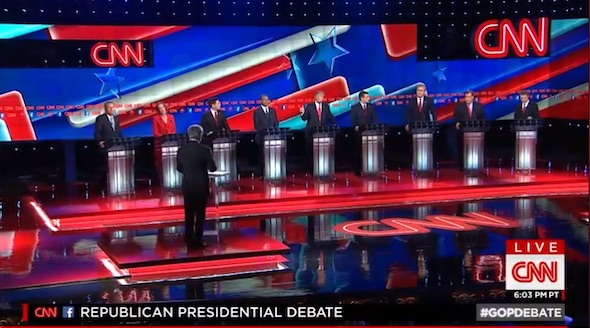
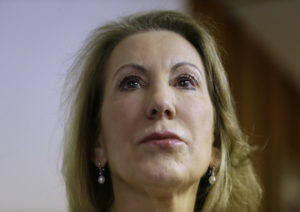
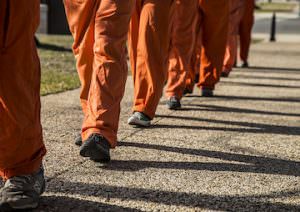
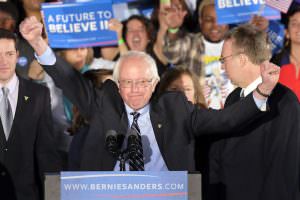
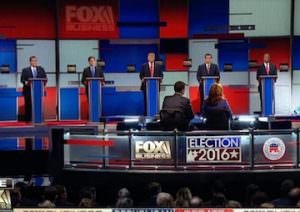
You need to be a supporter to comment.
There are currently no responses to this article.
Be the first to respond.